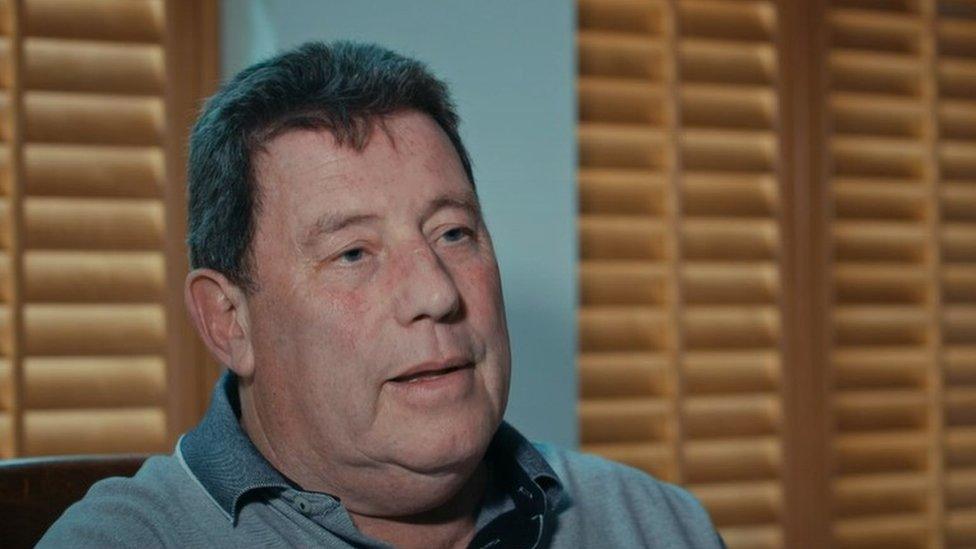Hooded Men: Police apologise over 1971 interrogations
- Published
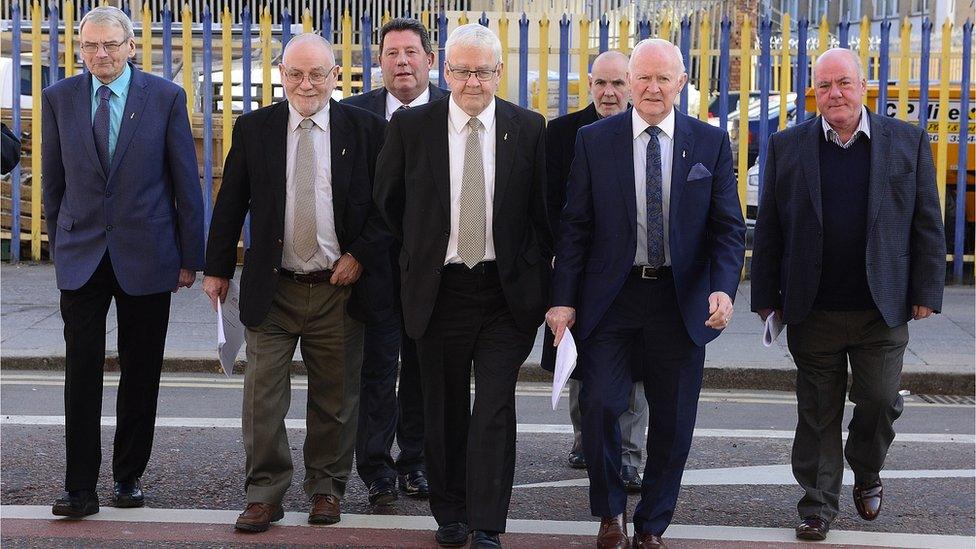
Some of the 'Hooded Men' - pictured in 2018
The Police Service of Northern Ireland (PSNI) has apologised to the 'Hooded Men' over their treatment under interrogation in 1971.
The 14 men were arrested during internment without trial and questioned by the police and the Army.
Two years ago the UK Supreme Court ruled that the techniques they were subjected to would be characterised as torture by today's standards.
They have long campaigned for an apology.
It comes a day after the death of one of the men, Joe Clarke, at the age of 71.
The apology had been hand delivered to Mr Clarke by his solicitor on Thursday, four days before he died.
On Tuesday, a spokesperson for the government said it acknowledged "the pain and suffering felt by so many during the Troubles".
"There are several ongoing legal proceedings in relation to this incident, and therefore it would be inappropriate to comment further at this stage," the spokesperson said.
The 'Hooded Men' case has been the subject of multiple legal actions in the UK and Europe for decades.
During interrogation at Ballykelly Army base, the men were hooded; beaten; deprived of sleep, food and water; and forced to stand in the stress position.
'The right thing to do'
PSNI Det Ch Supt Ian Saunders said the police had issued a formal apology for the "actions and omissions of police officers involved in their treatment whilst in police custody in 1971".
"The police service recognises the significant step taken today in issuing this apology," he said.
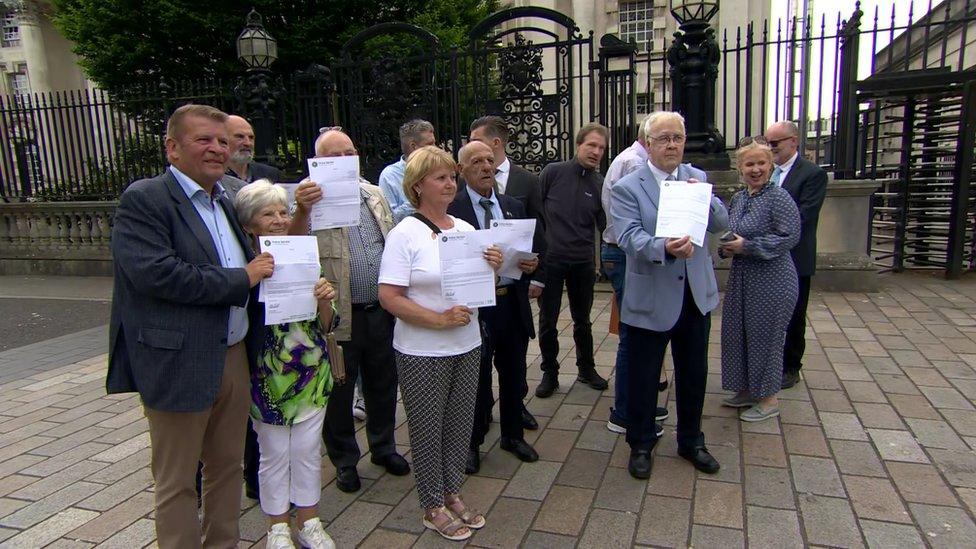
Some of the Hooded Men and families gathered after the announcement was made
"It is our view that this was the right thing to do to help give the 'Hooded Men' and their families recognition about how they were treated," he added.
The PSNI also expressed sympathy to Mr Clarke's family.
On Tuesday morning, the surviving members of the group received the PSNI's apology at a meeting in Belfast.
Solicitor Darragh Mackin said it had come after "weeks of intense negotiation which drew to a close in the days before Mr Joe Clarke tragically passed away".
“I believed they weren’t going to let us out alive”
"This is a seismic development in a seismic case," he said.
He added that the case would be pointed to as the "pin-up of due process, humanity and resolution coming together under one umbrella".
"This case is an example of why the efforts by the British government to brush the legacy of the past under the carpet will never, and can never, work."
'It lives with you'
He also paid tribute to high ranking PSNI officers, particularly Assistant Chief Constable Alan Todd and Det Ch Supt Saunders who "despite the sensitivities engaged in an extensive negotiation and, against all odds, ensured the delivery of an apology before the passing of Mr Clarke".
"The time is now for the government and Ministry Of Defence (MoD) to apologise for their part in these torture techniques. Today proves, nobody is above the law," he added.
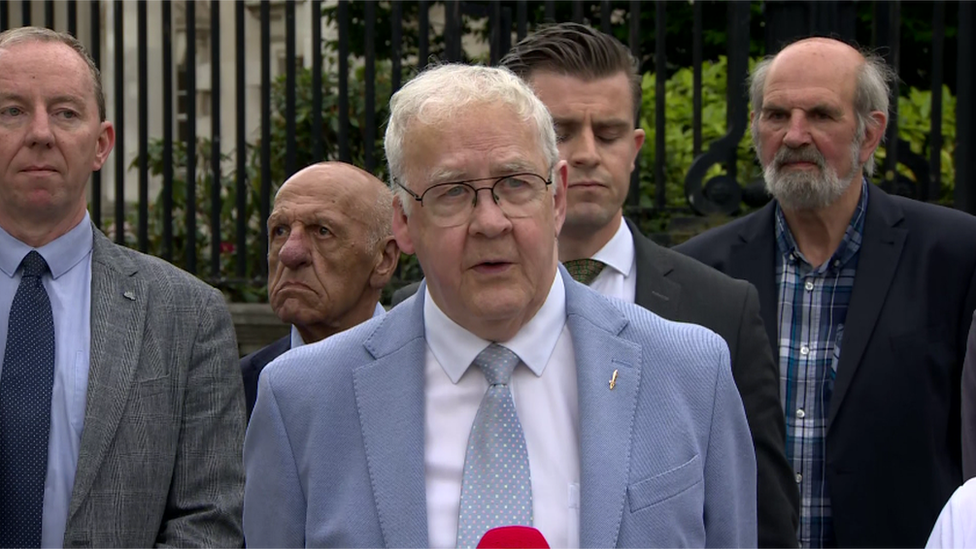
Francie McGuigan, said the news was "another step forward"
Speaking after the apology was issued, Mary McKenna, whose late father Sean McKenna was one of the 'Hooded Men', said "everyone is entitled to truth and justice and today we got some justice".
One of the men, Francie McGuigan, said the news was "another step forward," and paid tribute to Joe Clarke.
"He got an apology and was semi-conscious - lying on his death bed and he just said "brilliant" and tapped it sitting on his chest. Then he went back to sleep and I don't think he spoke after that," he said.
"The MoD and British government still have to be held accountable."
Kevin Hannaway, another one of the 'Hooded Men', said getting the letter had put Mr Clarke "to rest" but added that "he knew himself that the fight was far from over".
Tony Shivers, whose father Pat Shivers who was part of the group, said it was a "momentous day".
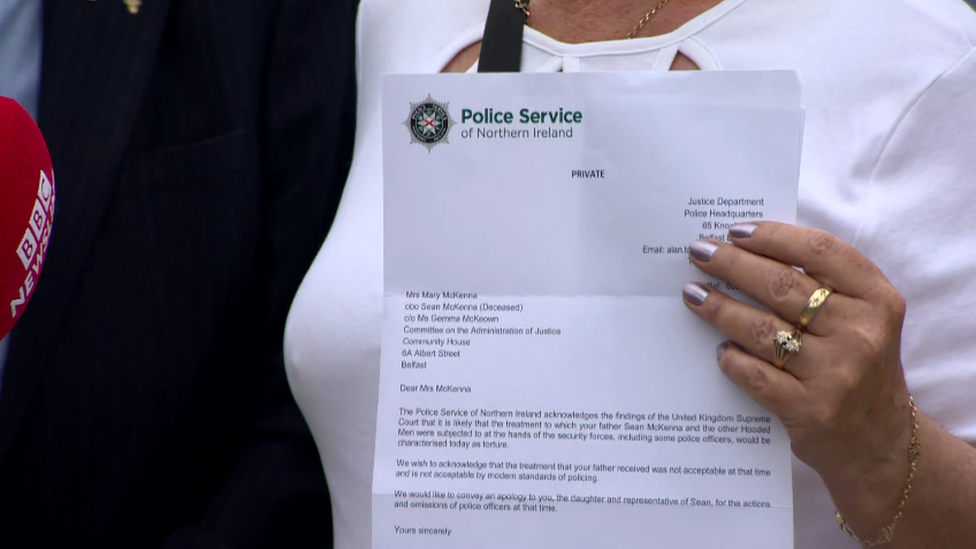
A family member holds up the letter from the PSNI
What happened to the 'Hooded Men'?
In 1976, the European Commission of Human Rights ruled that the five techniques used on the men amounted to torture.
This ruling was later referred to by the European Court of Human Rights in 1978, which held that the UK had carried out inhuman and degrading treatment, but fell short of defining it as torture.
In 2019, Lord Chief Justice Sir Declan Morgan, Northern Ireland's most senior judge, said their treatment "would, if it occurred today, properly be characterised as torture".
He said the ruling later by the Supreme Court in 2021 was "unbelievable", but that it was tinged with sadness that some of the "Hooded Men" did not live to witness it.
Related topics
- Published15 December 2021

- Published13 June 2023
